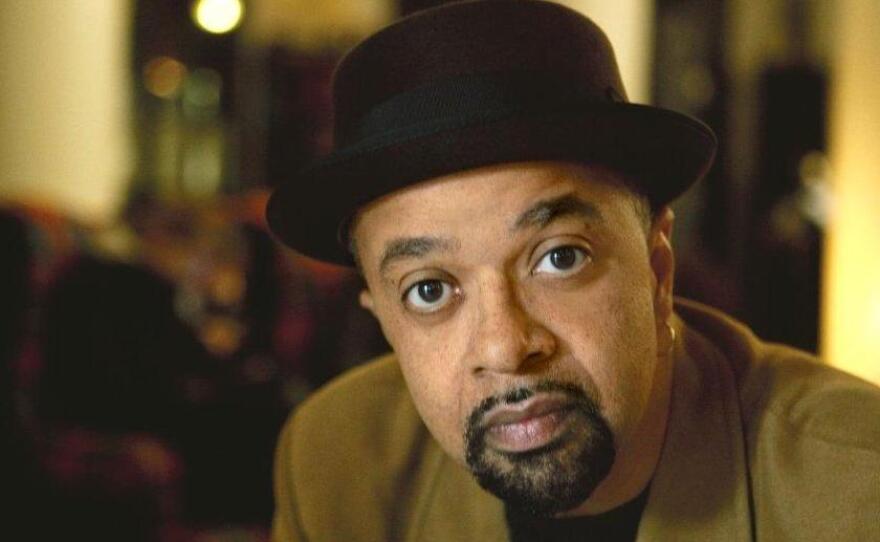Before abolitionist and Harpers Ferry raider John Brown became a hymn, he was a flesh and blood human being: Bible-thumping, rifle-toting, heroic and maybe more than a little unhinged.
A portrait of Brown and Frederick Douglass is at the heart of James McBride's The Good Lord Bird, a new novel with an unlikely narrator: a 12-year-old Kansas Territory slave named Henry Shackleford. Brown liberates Henry after a confrontation with Henry's master. He calls the boy — who has fair, curly hair and is dressed in a potato sack — Little Onion, but he thinks Henry is a girl, and to stay safe, Henry doesn't contradict him.
McBride is also the author of The Color Of Water: A Black Man's Tribute To His White Mother. He joins NPR's Scott Simon to discuss Brown's and Douglass' real friendship and why he wanted Henry to be mistaken for a girl.
Interview Highlights
On putting some of the Wild West into John Brown's story
"The hard part about writing about a guy like John Brown is that he was so serious, and his cause was so serious, that most of what's been written about him is really serious and, in my opinion, a little bit boring. Not all of it, but I wanted to kind of thrust him into the Jesse James category or the Western category so that people would appreciate, you know, what he really was and what he tried to do."
On finding Henry's narrative voice
"I love the language of, you know, the old, black, country man with a blues guitar and ... boots and the quick banter. ... I just love that voice and I wanted this character to be an old man looking back on his life and then telling a, just a grand whopper."
On the decision to have Henry mistaken for a girl
"I really had to put him in a situation where I could also kind of work with identity, which powers stories. And so it seemed fitting that he would be a black boy mistaken to be a black girl at a time when black life was not valued with the same equality that white life was valued. ...

"And also [I wanted] to communicate the overwhelming moral power and courage and drive of John Brown to release blacks from slavery whether they wanted to be released or not. Just the force of the man to just push into this tavern, get into a gunfight, grab this kid, run off not paying attention to whether the kid is a boy or a girl, because his charge is to free all African-Americans. And because he's wearing these blinders, if you will, he just doesn't see things that he should see."
On Henry's characterization of Frederick Douglass as a "speeching parlor man"
"Frederick Douglass refers to himself as that. Frederick Douglass was a man who made speeches; Henry was a kid who had been out on the plains and firing weapons and getting drunk and meeting parlor folks and so forth. He doesn't have a great regard for the East Coast abolitionist in general, which makes him that much more interesting and that much more compelling and also, in my opinion, more real.
"The abolitionists were not like the rugged people out West and they were not like John Brown either. They were people who made speeches and did politics. So in this book, there's no space for that. This is a book about real people who did real things, some of which are fictionalized but much of which is real, or was real and really happened."
On the relationship between Brown and Douglass
"In real life, they were good friends and in real life John Brown went to Frederick Douglass and said, 'I'm gonna attack Harpers Ferry and if you come, thousands of blacks will come.' ... So it was important to show that they had a very close relationship and that John Brown trusted Frederick Douglass, but that at the end of his life, John Brown was very disappointed that Frederick Douglass did not accompany him to Harpers Ferry on that suicide mission."
On Douglass' infidelity
"I had some fun with Frederick Douglass' character. ... You know, serious students of African-American history might not be pleased. ...
"Frederick Douglass was married to a black woman and he had a white mistress that at a certain point lived in the house with him ... a German woman. And it's true. ... She lived with him for a long time and then she went back to Germany at a certain point and ended up committing suicide. And then he had another white mistress who was younger and she hung about the house too."
On coming to terms with Douglass' flaws
"Listen, don't meet your heroes. If you meet your heroes, you're always going to be disappointed. Frederick Douglass was a great man, but would I want my daughter to marry him? Probably not. That doesn't mean that I don't think he's a great man. ...
"I think he was a great leader and he was a profoundly gifted writer as well. But you know the problem with leaders is that they have personal lives. Look, I think Frederick Douglass was flawed in the sense that he lived like a man who had power lived back in that time, and most men who had power lived the way they wanted to live. And women had very little, if any, power at all. I hope people don't take it personally; it's just an illumination."
Copyright 2023 NPR. To see more, visit https://www.npr.org. 9(MDAzMjM2NDYzMDEyMzc1Njk5NjAxNzY3OQ001))





